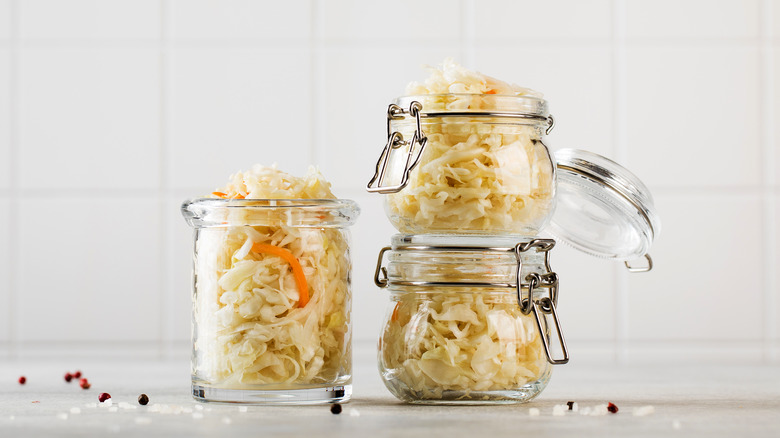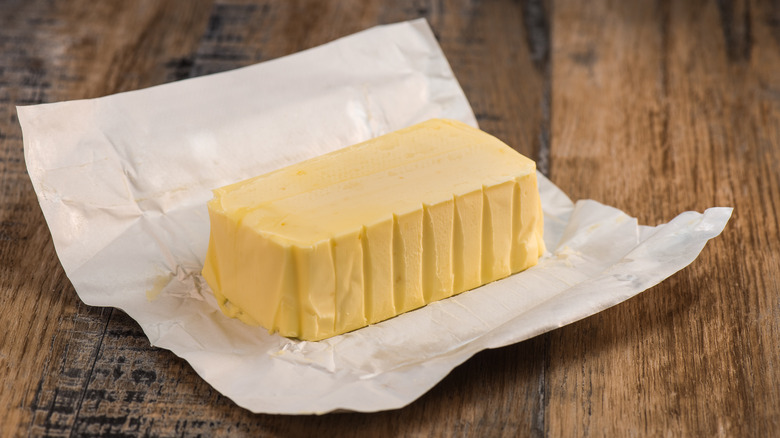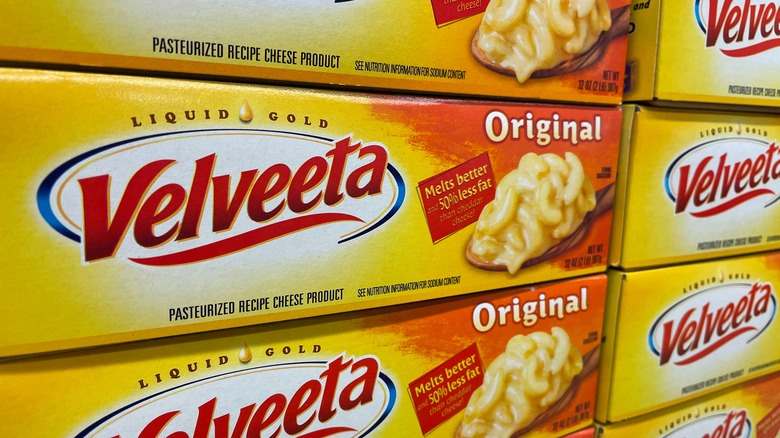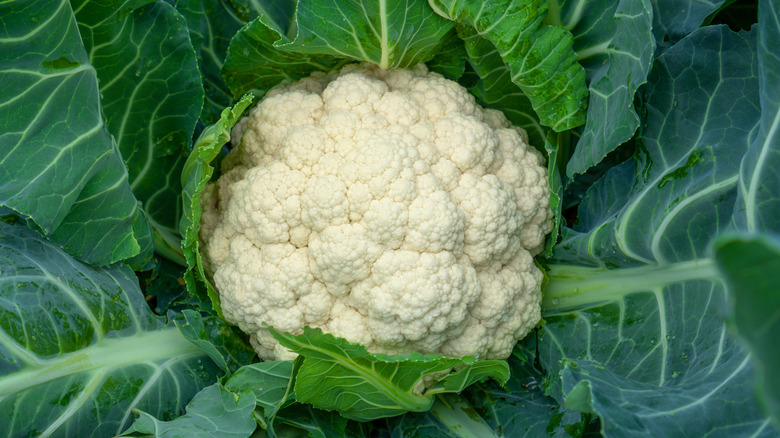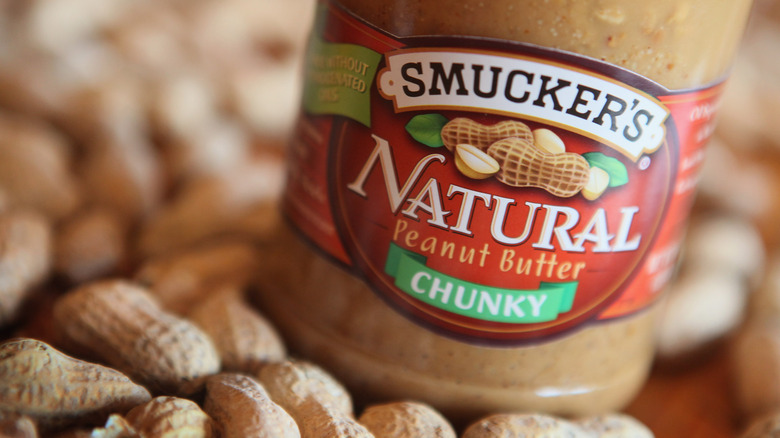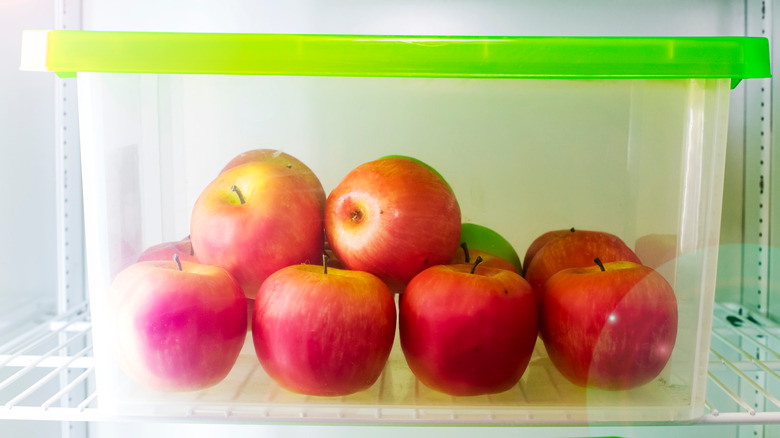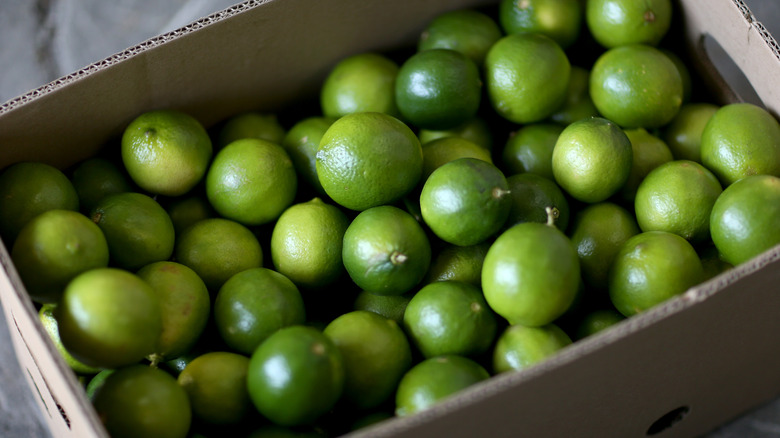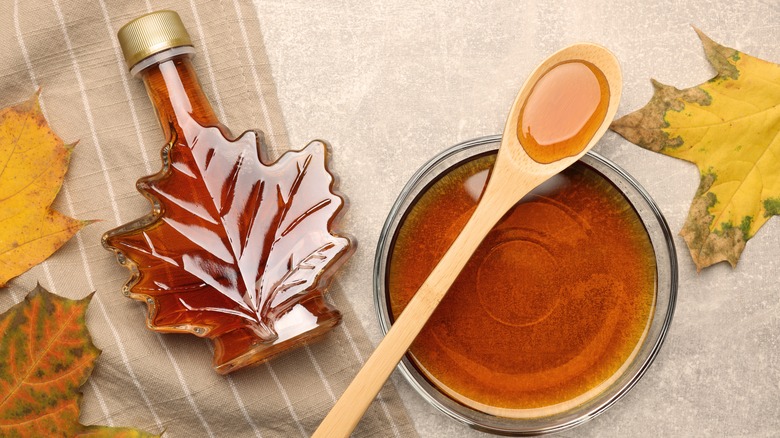What Really Happens If You Don't Refrigerate These Foods
When determining how to store different foods, some are more obvious than others. For example, it is no secret that foods like milk or raw chicken need to be refrigerated; otherwise, they will spoil quickly and likely stink up your kitchen in the process. On the other hand, there is no questioning that foods like dried pasta or cake mix do just fine in a room temperature environment. However, the lines can be blurred with other foods, and it isn't so apparent how to keep them fresh. Unfortunately, incorrectly storing food can lead to a change in texture and flavor, or worse, cause foodborne illness.
The foods on this list, although some unlikely, actually stay fresher under refrigeration. Once finding out how these foods are affected by leaving them at room temperature, you will definitely want to grab them from your pantry and transfer them to the refrigerator so that you can make the most of them.
Grapes
There is no denying that plump grapes are the perfect on-the-go snack or a fantastic addition to a cheese and charcuterie board. No matter how you enjoy them, it's good to know the absolute best ways to keep grapes fresh. Since you'll want your grapes to last as long as possible, keeping them in the refrigerator is a good idea. If you store them at room temperature, this will cause the grapes to spoil within just a few days of when you purchased them (via MasterClass).
Not to mention, they will likely become mushy fast, which isn't necessarily the most appetizing thing. Storing them under cold conditions ensures that they stay firm and fresh. Another great word of advice: Don't transfer them out of the bag you bought them in. The slotted plastic is ideal because it gives the grapes room to breathe; they wouldn't last as long if they were in a sealed environment. With these simple tips, the freshness of your grapes will remain much longer.
Cured meat
It is easy to assume that cured meat is shelf-stable forever since it is typically stored unrefrigerated at the grocery store. But here's why you should never store cured meats in your pantry: It will absolutely cause the meat to lose much-needed moisture. In addition, once you've opened the meat packages, the meat quality will slowly start to worsen if not correctly stored, from the texture to the flavor and everything in between.
Carnivore Club reports that the best way to go about preserving the meat is to keep it in the refrigerator, but remember to securely wrap it first. Another critical factor that will help the meat to remain of good quality is to store it away from light in general, so find a dark place in your refrigerator, like in a drawer. By doing this, you won't have to worry about your beloved salami drying out overnight.
Sauerkraut
If you are a sauerkraut fan, you probably have some stocked up at all times. Whether you make it yourself or buy store-bought sauerkraut, it's good to be aware of how to keep it fresher. The truth is that no matter how the sauerkraut is made, it is best to keep it in your fridge after opening it. This is because room temperature air will cause the sauerkraut to dry out, eventually losing probiotics as a result, according to Cleveland Kitchen.
The good news is that storing it in a cold environment will lengthen the amount of time it is suitable for. When comparing the differences in storage, keeping it in the pantry will only give you a month to use it up, whereas keeping it in the refrigerator gives you up to six months. So it's clear as day that the fridge is your best friend when it comes to keeping sauerkraut succulent.
Whipped cream
When baking, you might wonder how long whipped cream can be left out at room temperature. Although many people make whipped cream frosting for cakes and pies, the truth is that this product will be unsafe to eat when not stored in the refrigerator. It is best to keep your whipped cream dessert in the fridge until just before serving. Since it is a dairy product, it only takes a couple of hours of sitting out for it to become inedible.
But how about non-dairy whipped cream? Unfortunately, you must keep the non-dairy kind chilled as well. Not to mention, whipped cream will likely melt when it isn't under refrigeration anyways. Nobody wants to eat soupy cream that is supposed to be light and fluffy. The good news is that even with homemade whipped cream, you can keep it in the refrigerator, and it will hold shape for a day (via King Arthur Baking Company). So, if you find yourself with extra whipped cream, it buys you some time to use it up.
Infused olive oil
Making infused olive oil at home can undoubtedly add depth to the food you're making. But, whether you infuse the oil with different herbs or garlic, it is essential to know how to store it safely. Infused olive oil is one of the two items you shouldn't store in your pantry, according to Anne Burrell. This is because room temperature oil is a perfect breeding ground for bacteria to grow to unsafe numbers.
Even if you had rinsed and dried your fresh herbs beforehand, they likely still have small amounts of bacteria. The University of Maine notes that storing infused olive oil at room temperature could be so dangerous that it could cause botulism poisoning. Although it might be a hassle to try and use cold oil, keeping it in the refrigerator will put the brakes on the bacteria growth. After all, it is better to be on the safe side and avoid food poisoning at all costs.
Unsalted butter
There is something so appealing about leaving butter out at room temperature, specifically in a beautiful glass butter dish. Not only does it look charming on the tray, but when it's softened, it makes it much easier to spread on toast, muffins, and more. Baking with softened butter is even better because it makes it easy to whip the butter without lumps forming. So, do you really have to refrigerate butter? When it comes to unsalted butter, the answer is always yes. Unfortunately, leaving this product at room temperature will inevitably cause it to sour quickly.
As reported by Healthline, this isn't necessarily because of bacteria growth but because the butter has so much fat, which does better under refrigeration. In addition, keeping the butter cool will keep the flavor rich and creamy rather than rancid. So, although room temperature butter is a no-go, this doesn't mean you can't pop the butter in the microwave to soften it just before using it.
Velveeta
It is understandable to assume that Kraft products are all shelf-stable. After all, the company did market its products that way for the longest time. It was only a decade ago that Kraft wavered from the shelf-stable appeal and veered more toward promoting fresher products. Velveeta can indeed stay at room temperature before being opened. However, the untold truth of Velveeta is that it can't stay at room temperature forever. Once you have broken the package seal, the company recommends that you store the cheese product under refrigeration.
Even though it is a pasteurized product, that doesn't mean it's invulnerable to spoilage. Therefore, not refrigerating it will cause it to change its texture and possibly lead to an unpleasant taste or odor. The good news is that it can last over six months when Velveeta is stored correctly. So don't worry; you don't have to use all your Velveeta at once. Just make sure that once you cut into the cheesy block, you store it in the refrigerator afterward.
Brownies
Do you know what happens to brownies when they're not refrigerated? Don't worry; they are safe to eat when covered and stored on the counter. However, this storage method might noticeably dry them out, especially if you've already cut the brownies. After all the time spent making the silky batter and baking them to perfection, it would be a shame to have them dry out in just a day or two.
Luckily, there is a great way to combat this issue so that your brownies remain fudgy and moist. Placing them in a container and storing them in the refrigerator is one of the absolute best ways to keep brownies fresh. You could even go a step further and cover them in plastic wrap before putting them in the container. This simple practice could save your brownies from becoming a brittle disaster. Not to mention, the fridge will keep them fresh for up to seven days.
Cauliflower
Although some fruits and veggies stay fresher at room temperature, cauliflower is a vegetable that doesn't. In fact, one of the absolute best ways to store cauliflower is by placing it in a plastic bag (or a container that you can seal) within the refrigerator. Cauliflower can last a few days when sitting out on the counter, but it runs the risk of becoming rotten and shortening its life span by more than half.
Discoloration, softened texture, and lousy odors are all clear indicators of how to tell if cauliflower has gone bad. Additionally, mold is also another possibility that you can easily avoid. Therefore, unless you plan to use the cauliflower within a few days, the best course of action is to cover it adequately and ensure it stays cold. Ultimately, it makes more sense to keep the cauliflower chilled so that it remains crisp until you are ready to use it.
Natural peanut butter
Although processed peanut butter can stay in the pantry even after being opened, you might want to think twice about storing your natural peanut butter in the same place. When determining which foods should and shouldn't be refrigerated, natural peanut butter is certainly one that will benefit from being stored in a chilled environment. Storing this unprocessed product at room temperature will cause it to go sour, which nobody wants.
These effects can be apparent after just a couple of weeks because this type of peanut butter has a high content of natural oils that need to stay cold. Your best bet is to store the natural peanut butter in your refrigerator immediately after you open it. Although it can be a pain to try and spread firm peanut butter onto toast and other goodies, you can always pull the peanut butter out of the refrigerator beforehand to let it soften. Another trick is using a hot knife to scoop up the peanut butter, making it easier for you to get it out of the jar.
Apples
Apples are fruits that keep ripening even after they've been picked from a tree. The truth is that storing them at room temperature will aid the ripening process further, although they do look quite enticing when stacked in a fruit basket on the counter. Before you know it, the shiny and crisp apples can soon turn to mush, or brown spots can start making an appearance. The good news is that you can do certain things to keep the ripening process at bay so that all of your apples can last much longer.
The trick to keeping apples fresh longer is to store them in the refrigerator, specifically away from other produce if possible. Additionally, moisture can be an apple's saving grace when it comes to storage, so finding a way to add moisture to their environment can do wonders; draping damp linen over the apples will do. So, whether you are on your way to making a killer apple pie or apples are your go-to snack, you can have confidence that they will remain fresh for a more extended amount of time.
Limes
It can be tricky to determine which fruits need to be refrigerated and which don't. Although keeping limes on the counter is safe, it isn't the best route of action. When stored at room temperature, limes will go bad at a quick pace; they will dry out within just a few days. On the other hand, when they are correctly stored, they can stay fresh for up to a few months.
These lengths of time are drastically different, so learning the absolute best ways to store limes is crucial. First, placing them in the refrigerator is the primary practice to extend their freshness. Another fantastic trick you can try is to grab a container, put the limes inside, then cover the limes with water. Keep this container with the limes immersed inside your fridge. Undoubtedly, going the extra mile with this trick can preserve the moisture of the lime, therefore lengthening its life span.
Hard-boiled eggs
The boiling process kills all of the bacteria in eggs, so hard-boiled eggs don't need to be refrigerated, right? Not necessarily. Hard-boiled eggs are just as vulnerable to spoilage as scrambled eggs or poached, if not more. Although the bacteria on the shell dies during the boiling process, the protective coating on the outside is also cooked off (via Healthline). This makes it easy for bacteria to adhere to the egg and even creep through the surface.
So, what happens if you don't refrigerate hard-boiled eggs? The short answer is that room temperature air gives bacteria room to grow to unsafe amounts. On the other hand, storing cooked eggs in the refrigerator is a smart move that can save you from foodborne illness. So, next time you think about making hard-boiled eggs, remember that they are not invincible. Handle them with care by storing them properly, and you will certainly be thankful you did.
Maple syrup
You might wonder what happens if you don't refrigerate maple syrup. The truth is that this product is not as shelf-stable as one might assume. Although leaving maple syrup at room temperature for a few days likely won't cause any harm, extended periods of keeping it in the pantry will pose a risk. Maple Farmers reported that it's possible this would cause a change in the flavor of the syrup, weakening its sweet and pleasant taste.
Additionally, the main concern is that mold could grow inside the container. The most thoughtful approach to avoid these problems is storing the maple syrup in the refrigerator. It is also crucial to note that relocating the maple syrup from a plastic container to a glass one will help it stay fresher longer. With both of these clever tricks, your maple syrup will be on the right track to lasting longer and steering clear of pesky mold.
Worcestershire sauce
From using it in meatloaf to taking advantage of its unique flavor for cocktails, Worcestershire sauce is a multifaceted ingredient that is a cooking staple. Although it might be easy to conclude that this sauce is shelf-stable, the test of time and temperature would say otherwise. If you go through generous amounts of Worcestershire, you might go through it before it even has time to go bad at room temperature. On the other hand, if you only use this product every now and then, storing it in the refrigerator is the best approach to take.
So, what happens if you don't refrigerate Worcestershire sauce? In simple terms, it will only last so many months. After a while, its texture and flavor can start to deteriorate. Storing it in a cool place such as the refrigerator ensures that this sauce remains high-grade for up to three times longer. Evaluating how often you use it will help to determine if you should refrigerate it or not. Of course, it wouldn't cause any harm to store it in the fridge either way.



